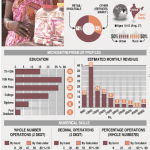‘Earn While You Learn’: Empowering Indigenous Students with Professional Skills in India and Beyond
Some 8.6% of India’s population is tribal. Historically, these indigenous inhabitants (known as Adivasi) worked in close proximity to nature and were the custodians of Mother Earth. In modern times, Adivasi often live a simple life, eating sustainable produce from the forest, using indigenous medicine, and employing their own form of learning, teaching through tales from previous generations. The rich heritage of their culture makes each tribal group unique — but nowadays, they suffer from a lack of formal learning and the vicious cycle of poverty. With the advent of the globalization era, their habitat has been ruthlessly destroyed by the mining industry. This has led to the displacement of the tribal people from their areas of origin.
Despite the constitutional promise of social justice and protection through affirmative action, the tribal population in India lives in deplorable conditions in the country’s dense forests and remote hinterlands. In the eastern state of Odisha, for example, almost 23% of the population is tribal — living in utmost poverty with low literacy rates, rampant child marriage and no access to healthcare facilities. There are too few schools and colleges in these tribal areas, and poor infrastructure, teacher absenteeism, lack of toilets, and pressure on students to work or care for siblings bedevil the education system there. To improve education and eradicate poverty, illiteracy and early girl marriages among this overlooked population, I started the Kalinga Institute of Social Sciences (KISS) in the early 1990s in Odisha, when India was just starting to integrate with the global economy.
I had faced similar struggles in my own childhood. After losing my father at the age of four, I was brought up amidst poverty and hunger, with six siblings and a struggling widowed mother in a nondescript village in Odisha. By earning a Ph.D. and becoming a self-made man, I came to understand that education is the weapon that can end the suffering of poverty that I’d experienced. My background had made me empathetic to the struggles of India’s tribal communities, which led me to establish KISS as a residential educational institution, with vocational and sports programs, all free of cost for tribal students.
KISS aims to provide a permanent holistic solution to end their intergenerational poverty through education, and in the decades since its founding, we have enrolled nearly 60,000 indigenous children from 62 tribal groups, while maintaining a 60% female student ratio. We provide education for 500 street children in our New Delhi campus, and 10,000 students in 20 of our satellite sites across Odisha, and in Nepal, Cambodia and Bangladesh. In 2017, KISS was designated as the first exclusive tribal school and “Deemed to be University” by the Ministry of Human Resource Development of India’s government — a designation that gives the academic status and privileges of a university to other institutions of higher education which work at a very high standard in specific areas of study. We operate with a not-for-profit model, with 90% of our funding coming from our affiliated, for-profit Kalinga Institute of Industrial Technology as a cross-subsidy, and 10% coming from donors and corporate social responsibility initiatives.
KISS’ Approach to Vocational Training and Skill Development
KISS’ EWYL program enables students to earn weekly or monthly wages of US $14 to $19, while they are upskilled to create apparel, paintings (in both the Madhubani and Saura painting styles), appliqué (ornamental needlework made with patches of fabric cut in different shapes and patterns, sewn onto a larger piece to form a picture or pattern), soft toys, household cleaning products and coir (in which coconut fiber is extracted from the outer husk of coconuts, and turned into products like floor mats, doormats, brushes and mattresses). The program imparts necessary occupational skills to these tribal students, preparing them to become successful entrepreneurs or to take part in the skilled workforce in the future.
Other vocational training areas in our EWYL program include:
- Computer education: A computer center on KISS’ campus allows tribal students who have expressed interest in computer classes to gain experience in technology.
- Composite Farming: While learning about the optimum utilization of agricultural land, students train on the cultivation of cash crops, vegetables and horticulture.
- Food Processing: Students learn how to produce pickles, squash, jam and other such products.
- Animal Husbandry: Students are trained in dairy, poultry and goat farming.
- Arts and Crafts: For students with artistic talents and attention to detail, arts and crafts training helps them hone their skills.
- Tailoring: Students learn tailoring and alterations.
- Soft Toys: Students are trained to make soft toys like teddy bears.
- Chemical Products: Students work in the production of household cleaning products, manufactured at KISS manufacturing facilities and adhering to safety rules.
- Recycled Paper Products: While learning how to prevent waste, students turn paper waste into paper bags and other products.
- Photo Framing: Students learn how to construct wooden photo frames.
Additionally, our students are involved in the Pradhan Mantri Kaushal Vikas Yojana — a skill development program supported by the Indian government. KISS also trains students as security professionals, drivers and medical attendants, mostly at our sister affiliates, the above-mentioned Kalinga Institute of Industrial Technology and Kalinga Institute of Medical Sciences.
How Large-Scale Student-Run Productions Empower the Local Economy
The KISS vocational programs enable student involvement in large-scale product manufacturing. Products made by the students are sold in the local markets and at the Kalinga Institute of Industrial Technology, which has a ready-made market that spreads across 25 square kilometers, with 18,000 students and 5,000 staff and employees.
Early on we decided that we would distribute one-third of the surplus from the sale of these products among the children enrolled in our vocational education. This provides them with funds that can support their loved ones or help launch their professional careers. To take one example, we have 1,000 students involved in painting, and the sale proceeds from these paintings exceed 10 million Rs — over US $132,000. Of this income, about $35,000 is surplus of which we distribute one-third, about $10,000, among the students involved in the painting skills program. Each student earns 700 to 1000 Rs — nearly $14-$19 per month — a respectable sum considering the national minimum wage for full-time employment is around US $62 per month.
Students have the option of sending their earnings home to their parents living in abject poverty in the local villages or depositing it in their own personal bank accounts. This jumpstarts their post-graduation life: Graduates are not only skilled professionals able to earn a living, but they’re also individuals with enough prosperity to have savings in their own bank account.
Through our free vocational training program, KISS has successfully diversified the skillsets of a sizable segment of tribal school students, preparing their entry into the professional workforce where they can contribute to our society. By jumpstarting our students’ individual prosperity, our vocational training is tightly linked to a holistic education that encourages students to take an active role in the broader society’s economic development and to uplift their local communities and villages by lending them their professional skills. With our Earn While You Learn program, KISS also meets the needs of local communities for skilled and mid-level professionals: A large majority of our students are hired in these growing, professional sectors of the economy.
With the ability to enter adulthood as highly trained professionals with skills that empower them to earn wages throughout their lives, our students can not only work themselves and their families out of poverty, they can become successful members of their communities while contributing to the country’s overall economic development. We see this as a multi-level impact focused on a historically marginalized population — and a model worth growing and replicating in other emerging economies.
Achyuta Samanta is the founder of the Kalinga Institute of Social Sciences and Kalinga Institute of Industrial Technology.
Photos courtesy of the author.
- Categories
- Education



